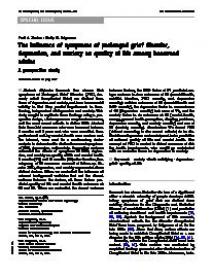The influence of symptoms of prolonged grief disorder, depression, and anxiety on quality of life among bereaved adults: A prospective study
Objective
Research has shown that symptoms of Prolonged Grief Disorder (PGD, formerly called Complicated Grief) are distinct from those of depression and anxiety, and have incremental validity in that they predict impairments in functioning, independent of depression and anxiety. This study sought to replicate these findings using a prospective design, a heterogeneous sample of mourners, and the most recent criteria to define PGD.
Method
Data from 346 mourners who were bereaved between 6 months and 2 years and who were recruited from professional and lay mental health care workers and the Internet, were used in a confirmatory factor analysis to determine the distinctiveness of symptoms of PGD, depression, and anxiety. Regression analyses estimated the effects of symptoms of PGD, depression, and anxiety on quality of life and mental health 6 months (T2) and 15 months (T3) after baseline, in a subgroup of 96 mourners assessed at follow-up.
Results
PGD, depression, and anxiety represented three distinct factors. When we controlled the influence of relevant background variables but not the shared variance between the factors, all three factors predicted quality of life and mental health outcomes at T2 and T3. When we controlled the shared variance between factors, the PGD factor at T1 predicted unique variance in four outcomes at T2 (mental health, suicidal ideation, PGD severity, and depression severity) and two outcomes at T3 (mental health and PGD severity), the depression factor in one outcome at T2 (depression severity) but none at T3, and the anxiety factor in six outcomes at T2 (mental health, energy, general health perception, sleeping problems, depression severity, and anxiety severity) and one at T3 (anxiety severity).
Conclusions
We found PGD (defined according to the newest criteria) to be distinct from depression and anxiety and to be predictive of reduced quality of life and mental health. The concept of PGD is needed to detect mourners at risk for health impairments, who would go undetected with an exclusive focus on depression or anxiety.
Geachte bezoeker,
De informatie die u nu opvraagt, kan door psychotraumanet niet aan u worden getoond. Dit kan verschillende redenen hebben,
waarvan (bescherming van het) auteursrecht de meeste voorkomende is. Wanneer het mogelijk is om u door te verwijzen naar de bron
van deze informatie, dan ziet u hier onder een link naar die plek.
Als er geen link staat, kunt u contact opnemen met de bibliotheek,
die u verder op weg kan helpen.
Met vriendelijke groet,
Het psychotraumanet-team.
In: European Archives of Psychiatry and Clinical Neuroscience, ISSN 0940-1334 | 257 | 8 | december | 444–452
http://link.springer.com/article/10.1007/s00406-007-0744-0


